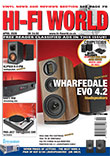|
Page 2 of 2
RT: You were an early adopter of High-Res?
TF: Yes, I started doing 96k in 1993. Later in 1997 I made a greater investment in High-Res in case DVD Audio and/or SACD ever happened.

Walthamstow Town Hall, where the Royal Philharmonic Orchestra with André Previn played Beethoven Symphonies.
RT: Do you feel you need really high-end equipment to reap the benefits of High-Res?
TF: When we made our first 24bit recording in Walthamstow Town Hall, the RPO with André Previn doing Beethoven Symphonies, I arrived early as the traffic can be terrible, and was listening to some takes from the previous day’s session. I had obtained a dithering box from Meridian, a 618, and was listening to different noise shapes, to see if truncation was the right answer, flicking between truncation and flat dither. One of the cleaners was there and I asked him in a series of blind tests if he could differentiate between the two, and he was 100% right each time. The truncation appeared a bit like a high-pass filter, there was a “cupped-hands” sound when it was truncated, and the strings went wiry; the differences weren’t esoteric at all. I quite like that sort of test.
So digital definitely has "a sound" one even a cleaner can hear! Digital processes are complex and we don't fully understand how what we do affects sound quality, but it does seem to.

Meridian 618 digital processor, popular in studios for digital recording.
RT: I’ve noticed that sometimes a good optical transport can provide better results on 16bit/44.1k than a laptop on High-Res. They are different families of sound, but there is a crossover point – it’s not an absolute result.
TF: One thing I notice about so-called “audiophile systems”, they never sound as good as they do playing off my hard drive recorded on SADIE on sessions!
In the old analogue days, there would be a good reason: 15ips first generation will always sound better than vinyl or cassette, but with digits you wouldn’t expect the results to be significantly different, and yet often I find when I listen to the finished CD, it sounds thinner, scratchier and drier and generally not as clean.
I don’t know how or why it happens, but there is obviously something that can happen with digits that can degrade the sound. I find that if I rip a CD into the SADIE, it sounds better than the CD!
RT: What differences do a good clock make to the overall sound. I noticed that when we worked together recently, you took great pains to get the clock right?
TF: The clock is a sort of “digital earth”, in the way that if you have a good vinyl system, you’d be very fussy about grounding.

A dCS Ring DAC based digital convertor.
RT: What does a good clock sound like?
TF: Two things: first of all the bass sounds much better extended and controlled, and secondly the top end and stereo imagery are much better. The first time I heard this with consumer equipment was when I was over in Japan, and I went to a hi-fi show where DCS had a CD player and had clocked the whole system to the DAC, so the sample point where the digits became analogue was crystal controlled, and this was sent to the transport. So the whole thing was held, absolutely rock-solid, bolted to the clock.
For me, this transformed the sound and was their justification for what was a premium price for what was a complicated product. At that stage many audiophile writers were worried that all digital products would sound the same, which thank-goodness is not the case at all! Some of them sound like breaking glass, some of them sound like you have a cold!
RT: Sometimes I think there is more snake-oil potential in digital than there ever was in vinyl.
TF: Yes, I think so, if you are a small manufacturer, unless you are very hot on the technical side, you’re just buying kits, a drive, a chipset, you can put your own power supply in, nice wires, but you don’t quite have the control that you’d have with vinyl, wiring up a moving coil cartridge, and the type of arm you can use. It’s a different set of snake oils!
NEXT MONTH (October 2012 issue - out now)
More on the way vinyl differs from modern day digital.
|









